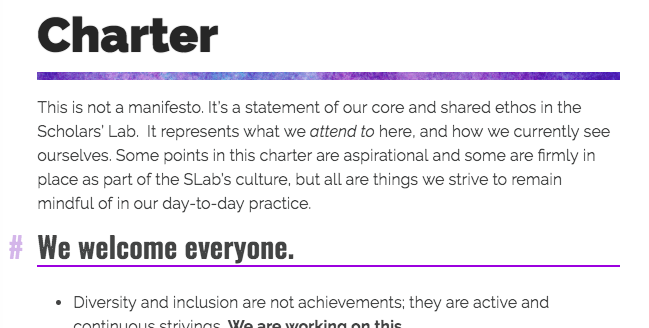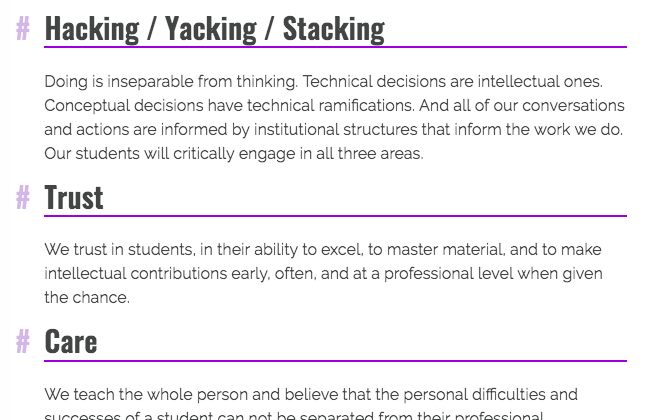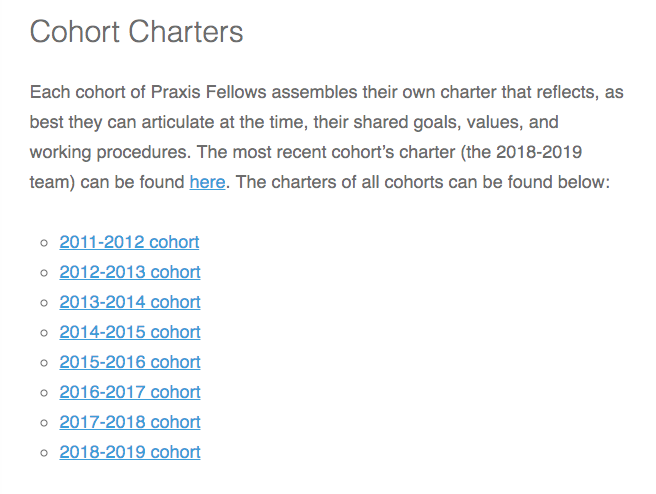A management charter (part 1)
I want to improve how my actions are guided by my values. Charters are written statements that can provide a public way to explore what matters and hold yourself accountable to that thinking; I’ve been thinking about writing personal charters to help me reflect on, remember, and explain my daily professional practices, as part of larger goals for how I live as part of my local and larger communities.
I’m planning to experiment with this both at the personal level—by significantly changing (and comparing those changes to) the values statement I wrote way back at the start of my dissertation (modeled on Scott Weingart’s “pledges”)—and at the lab level. But to move from thinking toward drafting, my first focus will be on something in between these two areas: a personal management charter, focusing on my responsibilities and ideal behavior around a web of related roles I explicit or implicitly occupy: management, supervision, leadership, direction.
Charters as team tools
Scholars’ Lab often uses charters to shape how we function as teams, such as our staff charter, the student programs charter and Praxis Program charter led by Brandon Walsh, and Praxis cohort charters (scroll down for list). We’re about due to reassess our staff charter, as it was co-written by the SLab staff before a number of current folks joined the lab. Rather than simply update or rewrite the charter, we’ll focus on charter formats and post-charter-writing actions, with questions like:
- Could it be useful to physically build a charter (e.g. in our Makerspace) rather than write one? What are other formats that are useful either in how they’re created, or in how we’re reminded of them? (e.g. I think one Praxis cohort read their charter aloud at the start of each session)
- Should we have a shorter, more concise charter with this next version, and use our blog for staff to annotate and expand on what individual components mean to their practice, especially as our thinking and practices change and are tested over time?
- How are we iterating on our charter? Can we have a system for regularly checking in as a team, and publicly discussing how the charter is shaping our choices and where we can improve how our work follows on our charter’s arguments?
To peruse examples of charters for DHy and library work, check out (and please add to!) this growing list of project and team charters and values statements I started (currently 28 items, thanks to collaborators’ additions), which in addition to Scholars’ Lab documents linked above includes:
- Colored Conventions Project principles, student and teacher memos of understanding
- Digital Black Bibliographic Project (DIBB) collaboration statement
- Postdoc Bill of Rights
- UCLA Student Collaborators’ Bill of Rights
- Design Justice Network Principles
- Michigan State University Project Charter Template
- Maryland Institute for Technology in the Humanities values statement
- INKE administrative structure omnibus document
- Collaborators’ Bill of Rights
Check out our blog for posts discussing the what and why of charters, e.g. thoughts from the 2013-2014 and 2011-2018 Praxis cohorts on their charter creation processes.

Screenshot of beginning of Scholars’ Lab staff charter, which can be read at https://scholarslab.lib.virginia.edu/charter/.
Charters for team members, charters for teams
I’ve learned a lot about the purpose and crafting of charters since coming to the lab, especially from Ronda Grizzle (our expert on teaching new lab community members, such as our Praxis scholars, why a charter might be useful to them, and how to create one) Brandon Walsh (from watching him lead creation of a lab Student Programs Charter and Praxis Program Charter, and our 2017-2018 and 2018-2019 Praxis Scholars (through watching their development of those hyperlinked team charters).
I’ve also learned a great deal, both about making charters that work and about leadership, from Laura Miller (Head of Public Services) and Jeremy Boggs (Head of R&D). I’m drafting a personal management charter for my own practices as a manager, to help me do my best by folks who report to me, and to help us discuss mutual needs. The plan is to share this charter with my colleagues, and improve it until it’s a document that represents their thinking and needs as well. But I’d also like to use that draft as a way to talk with other lab managers, both for my own learning and to think about ways our shared practices link back to our larger staff charter. Just from talking with Jeremy and Laura informally, I’ve already got a bunch of ideas for ways I can do better for our team.

Screenshot of a portion of Scholars’ Lab student programs charter, which can be read at https://scholarslab.lib.virginia.edu/student-programs-charter/.
Recording our shared commitments through a mutual management charter could help us continue growing policies and practices that make the lab a healthy workplace, and provide some continuity for current staff by abstracting lab management expectations from the people in management roles at any point in time. Not that any of us are leaving or aren’t acting with good intent! But anything we can do to ensure lab health doesn’t rely on particular individuals remaining in those roles and continue acting with both good intent and impact is work toward the lab’s health and justice. Such management agreement could also help us shape job ads and interview processes for future roles—both if we’re hiring managers and want to discuss our approaches with candidates, and to be able to share specifics with potential non-management staff interviewing with us.
Starting points: purpose & power
My personal management charter should communicate how I view my purpose in the lab as Managin Director. I work with the knowledge that the lab is a group of experts committed to, and long successful at realizing the lab’s mission, and thus my role as co-director focuses on:
1) continually developing the lab toward being a healthy, affirming, inclusive, equitable workplace, with the understanding that’s the foundation to achieving our mission (i.e. make the lab as workplace as safe, healthy, caring, respectful as we can, so our awesome folks can do their awesomeness)
2) contributing to our staff’s existing practice of being more than a set of folks who each do great work and happen to work in the same physical space (e.g. as another participant in their existing strong relationships and collaborations; as an advocate and representative for, and facilitator of, our team)
3) collaborating on framing and advancing the Scholars’ Lab as scholarly project
The shorthands I’m using in this post for what I want to think through—”supervision”, “management”, etc.—are largely defined by differences in power, so I’d also like this management charter to help me be more responsible, clear, and challengeable about how I act on and with my institutional and professional power, and around lab power differentials (useful, neutral, or harmful). This draft stakes out specific time for me to consider changes to my practices toward better lab equity, and also to design structures making it safer and more useful to other staff to point out and act (or request my action on) problems related to power differentials.

Screenshot of list of links to charters from Scholars’ Lab’s past Praxis Program cohorts, which can be read by visiting and scrolling down https://praxis.scholarslab.org/charter.
Management charter goals
Possible things this charter drafting could help me think through or do:
- Remind me to make time for things we already think of as responsibilities or best practices for lab management, and to annually check in whether I’m meeting these guidelines
- When I or others think of new practices to try or values to act on, have a place to record these to help me remember to test them out through regular practice and discussion with colleagues
- Let lab staff know what I’m trying to do, so they know what things I think I should be doing, and can more easily raise questions if I’m falling short on these or missing actions that would help them (keeping in mind that power imbalance again… it’s still potentially difficult for staff to bring up problems or suggestions, but at least they can know that I think I should care about XYZ, and can frame a difficult discussion around that belief rather than directly around me, if that feels more safe)
- Let staff choose to opt out of management practices if they’re currently unneeded (e.g. wishing to only schedule meetings to check in as the staff or their supervisor need, rather than scheduling more frequent meetings), rather than opting into practices when issues arise (harder, given the power dynamic)
- Help new staff know some of our tacit expectations of their managers that might feel uncomfortable to ask about (e.g. changing their working hours or location to allow family support)
- Having a clear sense of what value we provide to our colleagues through acting as supervisors/managers/directors/leaders/etc. (will discuss these terms more in part 2 of this post series: which are useful, which can’t be self-elected), and checking in with both our reporting staff and our supervisors that they also feel these are useful things to provide
Drafting the charter
Part 2 of this post will provide context for those outside the lab about how the lab’s mission and the lab’s staff activities inform this management charter work. I’ll also share some topics I’m considering covering in my management charter draft, as well as some potential text I’m planning to share with my colleagues for feedback.
